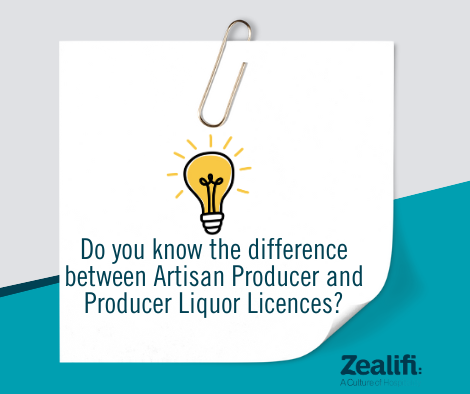Our RMLV Trainers often get asked ‘What is the difference between the Artisan Producer Liquor Licence and Producer/Wholesaler Liquor Licence?’ They are both types of licences related to the production and distribution of alcohol, but they differ in terms of their scope and requirements. The Artisan Producer Liquor Licence was introduced here in Queensland April 2020. Here are the key differences:
Artisan Producer Liquor Licence
- Target Audience: This licence is typically for small-scale, local producers of alcoholic beverages (like craft brewers, distillers, and winemakers) who focus on high-quality, artisanal production methods.
- Production Limitations: There are usually size, and production limits tied to this type of license. The goal is to support small businesses and local craftsmanship. Craft Beer in volumes greater than 2,500 litres and less than 5 million litres and Artisan Spirits in volumes greater than 400 litres but less than 450,000 litres
- Sales Focus: It often allows the producer to sell directly to the public (such as through a taproom, tasting room, or retail store). The focus is on limited-scale production and community-based sales.
- Distribution: Typically, artisan producers may have more limited options for broader distribution or wholesaling compared to larger producers. They might be restricted in how much product they can distribute or the markets they can serve.
Producer/Wholesaler Liquor Licence
- Target Audience: This licence is intended for businesses that not only produce alcoholic beverages but also wish to engage in the wholesale distribution of these products. Larger operations or producers who want to distribute their products to retailers, bars, and restaurants would typically apply for this.
- Production and Distribution: There are fewer production restrictions compared to the Artisan Producer Liquor Licence. A Producer/Wholesaler is allowed to produce large quantities of alcohol and distribute it to other businesses for resale.
- Sales Focus: Unlike the Artisan Producer Licence, which may focus more on direct sales to consumers, a Producer/Wholesaler licence often involves a broader distribution strategy, including working with a network of retailers, restaurants, and other wholesalers.
Key Distinctions
- Scale of Production: Artisan Producer Licences are often for smaller producers, while Producer/Wholesaler Licences accommodate larger-scale production.
- Direct Sales vs Wholesale Distribution: Artisan Producers might be more focused on direct-to-consumer sales, while Producer/Wholesalers are more focused on supplying products to other businesses (like bars, restaurants, and retail stores).
- Regulatory Scope: The Artisan Producer Liquor Licence usually has more stringent regulations about production size, and the Producer/Wholesaler Liquor Licence tends to be more permissive in terms of both production and distribution.
Both licences cater to different business models within the alcohol industry and are designed to support specific types of operations.

